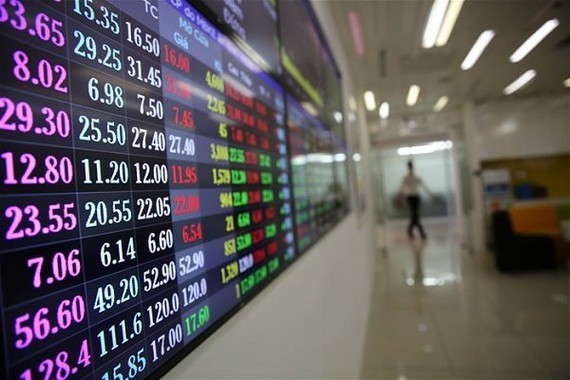Strong net selling
Since early 2020, foreign investors have maintained a net short position on the stock market. In April 2021, foreign investors net sold VND 4,300 bn on HoSE for the seventh consecutive month. Statistics show that VN30 stocks net sold VND 3,700 bn, equivalent to 86% of the net selling value on HoSE through matching transactions. Similarly, domestic institutional investors also maintained a net selling move with value of nearly VND 3,900 bn, of which the proprietary trading sector of securities companies net sold VND 677 bn. The stocks that were strongly net sold by domestic institutional investors were VPB, FUEVFVND, MBB, HNG, KDH, HPG, MWG, FLC, and MSN. Besides these, proprietary trading strongly sold FUEVFVND, HPG, and VRE.
Contrary to selling by foreign investors and institutions, the number of accounts of F0 investors showed no signs of stopping, even increased sharply in the first three months by 65%, compared to the whole of 2020. Even so, the number of investors opening new accounts in last four months reached a record of 366,816 accounts, equivalent to 93% of new accounts opened in 2020. Thus, by the end of April, the number of trading accounts were more than 3.1 million accounts. Although the number of newly opened accounts increased sharply, many securities experts still forecast that the number of new investors will continue to increase, but the record in April is likely to decrease. The reason is that bank interest rates remain low and people tend to withdraw money in search of more profitable investment opportunities.

Margin cash flow
The above figures partly reflect the current situation of cash flow in the stock market. However, this does not mean that individual investors are dominating the stock market and margin cash flow is no longer being used. According to a securities expert, individual investors, especially F0 investors, are usually small and medium-sized stocks, while foreign investors and institutional investors often tend to choose stocks in the VN30 stock group. These are the stocks that lead the market. For example, in the mid-May trading week, VN Index gained 24.55 points with strong support from three stocks, namely, MSN, VPB, and CTG. According to statistics, these three stocks contributed to the VN Index with 4.09 points, 3.33 points, and 3.17 points, respectively.
Margin cash flow had statistically decreasing numbers, but the impact of this cash flow on the market is extremely important. In fact, capital inflow from individual investors can only help VN Index not fall deeply, while margin cash flow is the driving force for index to break out. As mentioned above, the decrease in margin capital ratio is because many securities companies have reached the prescribed maximum threshold, while in fact, the demand for margin is still very huge. This is the reason why many securities companies, even though they have not yet reached the threshold, also entered the race to raise capital to improve their underwriting capacity, investment capacity, and margin lending capacity. In this race, margin capital is forecast to increase again in the near future, at the latest in the third quarter.
Bank funding
Currently, the lending capital of securities companies is not their own capital, but mainly bank loans or short-term and long-term bonds. According to statistics from the State Bank of Vietnam, by the end of the first quarter, outstanding loans in the securities sector reached VND 45,326 bn, equivalent to the same as at end of 2020, in which, short-term securities outstanding loans accounted for 96.21%.
Outstanding loans are concentrated mainly in a few credit institutions such as Vietcombank, accounting for 25.75% of total securities outstanding balance in the whole system; BIDV accounting for 13.47%; Techcombank accounting for 12.46%; TPBank accounting for 8.91%; VIB accounting for 5.25%; Vietinbank accounting for 4.25%; and MSB accounting for 4.16%. Foreign financial institutions operating in Vietnam are also major financial institutions for securities companies such as Wooribank, Indovinabank, Shinhan Vietnam, KB Kookmin Bank, Korea Investment Holding Co. Ltd, and Maybank Kimeng Holding Limited.
Statistics show that the total debt of twenty largest securities companies in the market mainly comes from bank loans of value VND 92,619 bn, up 27.2% compared to the number of loans at the beginning of 2021. In this, Saigon Securities Company (SSI) leads the way with total outstanding balance of VND 24,227 bn, followed by VNDirect Securities (VND) with VND 11,556 bn, Mirae Asset Securities (MAS) with VND 8,829 bn, Ho Chi Minh City Securities Company (HSC) with VND 8,447 bn, and VPBank Securities Company (VPS) with VND 6,834 bn.
In addition to bank loans, securities companies often supplement capital for operations by increasing equity based on accumulated profits from business activities. However, accumulated profit cannot increase rapidly because it depends on periodic business results, so many securities companies tend to offer shares to increase charter capital. The capital increase plan is applied by many securities companies at present time.
For example, SSI stated in its report at the 2021 Annual General Meeting of Shareholders about the issuance of 219.69 million shares to increase capital to VND 11,000 bn. If issuance is successful, SSI will have a capital size equivalent to some other banks such as TPBank, LienVietPostBank, VIB, and OCB. Similarly, VNDirect (VND) plans to issue more than 214.51 million shares to existing shareholders with a 1:1 issue ratio. It is expected that VNDirect will earn more than VND 3,110 bn from this issuance and will also double its capital amount.
























